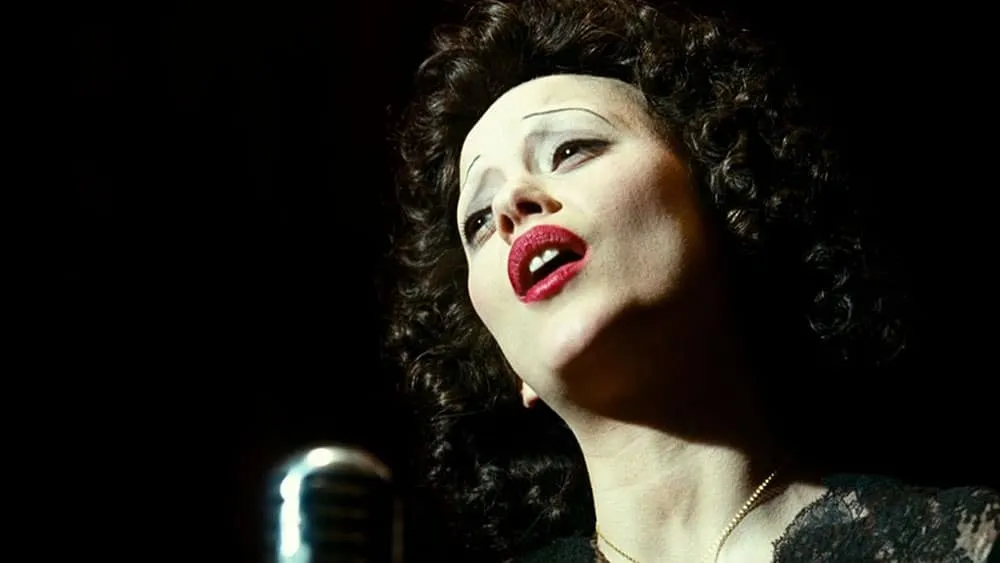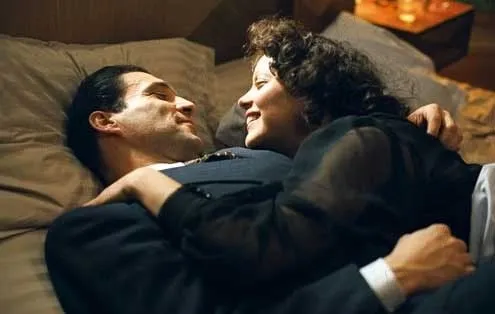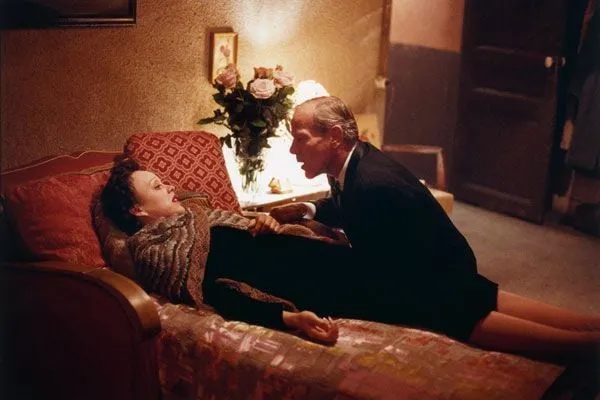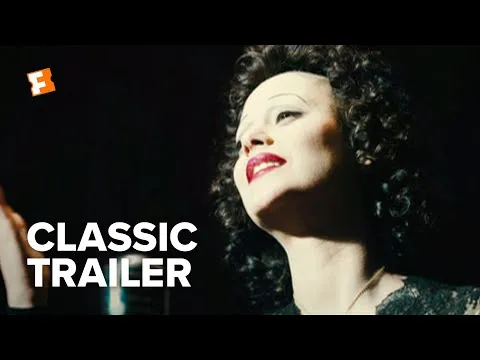
source
Two nights ago, I had the tremendous pleasure of enjoying La Vie en Rose, a film by Olivier Dahan, and despite being quite a few years since its release in 2007, I had never had the chance to see it. It's one of those films that grabs you with a scene. I was just passing by, intending to sleep, my mother was sitting in front of the television, and then I saw Edith Piaf sing. I stopped, then sat down in front of the screen and didn't get up again until the end.
I felt an almost immediate connection with the atmosphere of the image but much more with a Marion Cotillard whom I only recognized by her eyes, as she was transformed in order to embody the character. And yes, the work of period reconstruction and the cinematography are extremely magnificent, but the real fascination lies with its leading actress. It is impressive how she takes on what, in my modest opinion, is the role of her life.
From her voice to her body language, Marion stops being the beautiful and sensual woman I had previously seen in "Public Enemy*, Taxi or Batman: The Dark Knight, and becomes the Little Sparrow. Her acting work offers brilliance and an exquisite care for characterization, hours of study, a willingness to strip away her physical beauty or the natural tone of her voice to show us a woman with lights and shadows, with a life marked by physical and psychological pain due to the abuse of her capabilities to unimaginable limits.
As if it were the restless nature of the sparrow, the story is presented in fragments, sometimes leaving traces of suspense by not concluding an event to take us to a new page in Piaf's book of life. But, although for some it should have been sequenced chronologically, in my opinion that would have been an ill-conceived choice. The use of a consecutive narrative would have shattered that concept of understanding the internal chaos of an Edith in vertigo since childhood, a daughter of the streets and the prostitutes, singing for money, extorted by a pimp who forced her to sing, a victim of morphine and alcohol abuse who ultimately dies prematurely at 47 with the hunched appearance of an old woman.
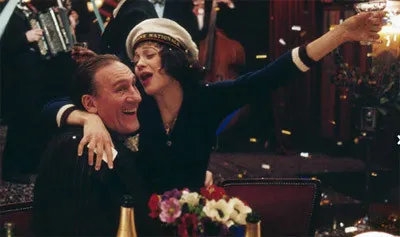
No, a chronology would have broken that magic that captivates and drives the viewer's emotion toward that whirlwind in which we fully identify with the singer.
Edith herself did not have a coherent development.
Therefore, I believe that Dahan proposes these extreme leaps in the dramatic thread: from happiness to the misery of the heart, from childhood to advanced illness, from applause to uncontrollable crying or hysteria, from love to love, with the greatest being the one she had for Marcel Cerdan, World Boxing Champion.
In short, those 'gossipy' details of her intimate life are replaced by the image that collectively, actors, director, and audience, are building to essentially get closer to the singer from the marginalized neighborhoods of Paris, as the center of her universe of great stars, friends, lovers, admirers, all transient and revealing their unique dark loyalties, their real addictions: singing, failed loves, alcohol, and morphine.
Considering it is a biographical drama, it is logical that the focus lies on the protagonist; however, the cast is a continuous runway of stars. Thus, he summons Gérard Depardieu, Pascal Greggory, Sylvie Testud, or Jean-Paul Rouve, to name just a few.
Of course, the universe presented to us in La Vie en Rose, a title that pays homage to Piaf's most popular song, is beautifully enhanced by its music. Melody after melody, the psychological atmosphere is created, the other part of the story: the sensitive one. It's no coincidence that it starts with La Marsellaise, the first song she performed with her powerful and captivating voice as a child, and ends with Non, je ne regrette rien, as if each phrase of the song ironically summarizes her life.
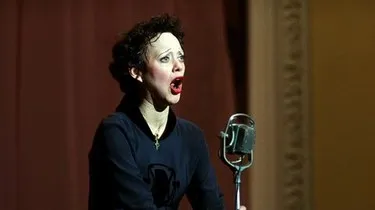
Perhaps there was no irony at all, maybe that resilient Edith, the little sad sparrow, actually never regretted any of her flights...
Friends of #CineTv, I hope that if you haven't had the opportunity to appreciate this biography, you do so soon. Like any other work of such nature, it may be slow at times, but the feeling, the message, the values mentioned, and those I haven't addressed to avoid making this comment exhausting and to leave space for surprise, guarantee a beautiful experience. I am sure you will be able to connect immediately with its resources and finally, like me, enjoy it.
Official Trailer
I will see you very soon with a new review. Until then, I send you hugs of light.

Content are my propperty, translated with Google Translator. Banners made in Canva


source
Hace dos noches tuve el tremendo placer de disfrutar de La Vie en Rose, una película de Olivier Dahan y que, a pesar de contar con unos cuantos años ya desde su estreno en 2007, nunca había tenido la ocasión de ver. Es de esos films que te atrapan con una escena. Iba de paso, con intención de dormir, mi madre estaba sentada frente al televisor y entonces vi a Édith Piaf cantar, me detuve, luego me senté delante de la pantalla y no volví a levantarme hasta el final.
Sentí una conexión casi inmediata con la atmósfera de la imagen pero mucho más con una Marion Cotillard a quien únicamente reconocí por sus ojos, pues estaba transfigurada en pro de encarnar el personaje. Y sí, el trabajo de reconstrucción epocal y la fotografía son en extremo magníficos pero la fascinación real recae sobre su actriz protagónica. Es impresionante su manera de asumir el que, en mi modesta opinión, es el papel de su vida.
Desde la voz hasta su lenguaje corporal, Marion deja de ser la mujer hermosa y sensual que antes viera en Enemigo Público, Taxi o Batman: El Caballero de la Noche para convertirse en el Pequeño Gorrión. Su trabajo actoral ofrece brillantez y un cuidado exquisito de la caracterización, horas de estudio, disposición para despojarse de la belleza física o del tono natural de su voz hasta mostrarnos a una mujer con luces y sombras, con una vida signada por el dolor corporal y psicológico tras el abuso de sus capacidades hasta límites insospechados.
Como si de la naturaleza inquieta del gorrión se tratase, la historia se va presentando fragmentada, a veces dejando trazas de suspense al no concluir un evento para llevarnos a una nueva página del libro de vida de la Piaf. Pero, aunque para algunos debería haber estado secuenciada cronológicamente, en mi criterio eso hubiera sido una elección desasertada. El empleo de una narrativa consecutiva habría dado al traste con ese concepto de entender el caos interno de una Edith en vértigo desde la niñez, hija de las calles y las prostitutas, cantando por dinero, extorsionada por un proxeneta que le obligaba a cantar, víctima del abuso de la morfina y el alchol y que finalmente muere de manera prematura a los 47 años con el aspecto encorvado de una anciana.

No, una cronología habría roto esa magia que engancha y mueve la emoción del espectador hacia ese torbellino en el que nos identificamos plenamente con la cantante. Edith misma no tuvo un desarrollo hilvanado.
Por ende, creo que Dahan propone esos saltos extremos en el hilo dramatúrgico: de la felicidad a la miseria del corazón, de la niñez a la enfermedad avanzada, del apluso al llanto incontrolable o la histeria, de amores en amores, significando el mayor de ellos, el que tuvo por Marcel Cerdan, Campeón Mundial de boxeo.
En fin, esos detalles “chismosos” de su intimidad, son sustituidos por la imagen que de conjunto, actores, director y espectador, vamos construyendo para acercarnos esencialmente a la cantante de los barrios marginales de Paris, como centro de su universo de grandes estrellas, amigos, amantes, admiradores, todos transitorios y dejando ver sus únicas oscuras lealtades, sus reales adicciones : el canto, los amores fracasados, el alchol y la morfina.
Tratándose de un drama biográfico es lógico que el interés actoral recaiga sobre la protagonista, sin embargo el elenco es una continua pasarela de estrellas. Así convoca a Gérard Depardieu, Pascal Greggory, Sylvie Testud o Jean-Paul Rouve por solo citar algunos nombres.
Por supuesto, el universo que nos entrega La Vie en Rose, título que hace homenaje a la canción más popular de Piaf, está preciosamente ambientado por su música. Melodía tras melodía se va generando el clima psicológico, la otra parte de la historia: la sensible. No por gusto empieza con La Marsellesa, lo primero que interpretó con esa voz suya poderosa y cautivadora siendo una niña y termina con Non je ne regrette rien, como si cada frase de la canción estuviera resumiendo su vida irónicamente.

Quizás no hubo ironía alguna, quizás esa Edith resiliente, el gorrioncillo triste, en realidad nunca lamentó ninguno de sus vuelos…
Amigos de #CineTv, espero que si no han tenido la oportunidad de participar de apreciar esta biografía lo hagan pronto. Como cualquier otra obra de tal corte puede resultar lenta por momentos pero la sensación, el mensaje, los valores citados y los que no abordé para no hacer este "análisis" extenuante y dejar espacio a la sorpresa, garantizan un hermosa experiencia. Estoy segura de que podrán conectar de inmediato con sus recursos y finalmente, como yo, disfrutarla.
Trailer Oficial
Les encuentro muy pronto con una nueva reseña. Hasta entonces, les dejo abrazos de luz.

Contenido de mi propiedad, traducido con Google Translator. Banners diseñados por mí usando Canva
I invite you to visit the project DRIP - WITNESS NODE - BPUD

Support the witness and vote for TheBbhProject! Project carried out by @bradleyarrow

